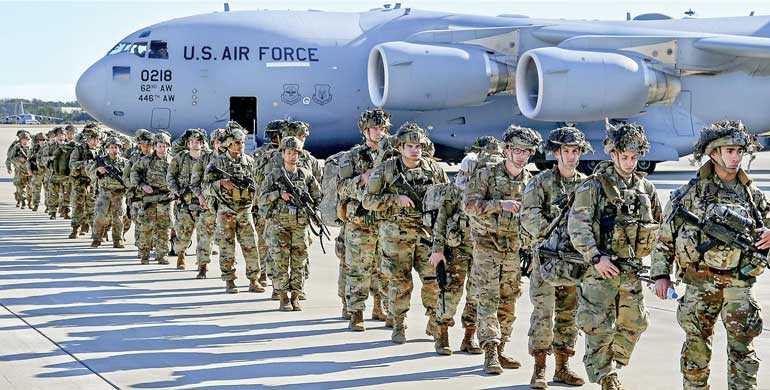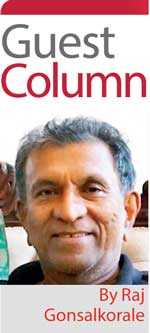Wednesday Feb 25, 2026
Wednesday Feb 25, 2026
Monday, 24 February 2020 00:00 - - {{hitsCtrl.values.hits}}

It is the SOFA that will open the floodgates for a US Military presence and involvement in Sri Lanka, and there is ample evidence that they have done more damage than good to the countries on which they have encroached
In an article titled ‘Gen. Shavendra travel-ban decision made at US Embassy-Sri Lanka’, columnist Daya Gamage says in an article published in the Asian Tribune on 17 February (http://www.asiantribune.com/node/93411) that: “The pivotal decision to deny US entry visa was exclusively made within the Chancery of the American Embassy, Colombo. The decision was made at a meeting of the ‘Country Team’ which comprised, among others, Ambassador Teplitz, her Deputy Chief of Mission, Counsellor for Political Affairs and Head of the Consular Affairs, as a reaction to Government of Sri Lanka’s disregard of Ambassador Teplitz’ Media Note last August unfavourably reacting to Lt. Gen. Shavendra Silva’s appointment as the Commander of the Army, and irritation by his elevation to acting Chief of Defense Staff by the new President Gotabaya Rajapaksa.”
Many analysts and political commentators will be writing on this topic and pointing out the different standards that apply to a senior Army Commander from Sri Lanka and Army Commanders from the USA itself who are engaged in several battle zones, which are of course not in USA, nor fighting a group of terrorists labelled the most ruthless terrorist group in the world at that time.
Their contention would be that Sri Lankan generals and its Armed Forces fought to save Sri Lankans from such a terror group on Sri Lankan soil.
It is not clear to Sri Lankans why US Army Commanders are fighting in other countries when there is no perceived threat to the USA within the USA from such combatants. It is also not clear who is to report and judge whether US Armed Forces commanders are upholding human rights laws, especially where modern technology rather than conventional techniques are used to eliminate “perceived” threats outside the USA.
MCC and SOFA
However, leaving aside the issue of any justification or otherwise for General Shavendra Silva’s travel ban, there are concerning issues which could have an impact on whether Sri Lanka should or should not sign the MCC and SOFA agreements. The proponents for the MCC agreement going ahead will argue that the MCC agreement has no link to the SOFA agreement.
On paper there isn’t. They may suggest changes to the content of the agreement as they will not see the potential dangers from likely linkages.
Ostriches do not see anything when their heads are in the sand.
A question that is valid and should be asked in this instance is: “What is in it for the USA if the MCC agreement is signed?”
A $480 million grant is no chicken feed, and it is unimaginable that benevolence of such a proportion without expectations of a return would be offered to Sri Lanka by any benefactor, either the USA or anyone else. 
Is this generosity just simply an investment to “buy” Sri Lanka’s friendship? Would this generosity have been offered if Sri Lanka was not located where it is now located? Would it have been offered if China had not already made their presence felt in Sri Lanka?
The MCC Agreement will have its own positives and negatives, and no doubt the committee appointed by President Rajapaksa will look into these. It is unclear though whether the terms of reference of this committee extend to looking beyond such positives and negatives to the potential wider ramifications arising from signing the MCC agreement.
As this writer pointed out on several previous occasions, as have others, it is the SOFA that will open the floodgates for a US Military presence and involvement in Sri Lanka, and there is ample evidence that they have done more damage than good to the countries on which they have encroached. There are enough ongoing situations to illustrate this.
Among other factors, the exhaustive Asian Tribune article by Daya Gamage raises two issues that the Sri Lankan Government and public should take note of in relation to possible outcomes arising from signing the MCC Agreement followed by the SOFA.
Firstly, that the US positions relating to local political and governance matters, no doubt looked at from the wider perspective of regional politics involving China and India, are taken by the US Embassy in Colombo. Secondly, even an independent high-level US State Department body such as the Office of the Inspector General has no effective clout or a role to counter positions formulated by the Colombo Embassy.
Gamage’s extensive coverage points out this position quoted in full in the following extract.
State Dept. Inspector-General declares US Embassy war reporting ambiguous
The strictly independent and non-partisan Office of Inspector General (OIG) of the Department of State investigating the manner in which the US diplomatic mission in Sri Lanka gathered data and information during the final months (January through May 2009) of the Eelam War IV and how it analysed them to report to the Office of Global Criminal Justice (OGCJ) of the State Department found that the pronouncements, determinations and analyses of the two State Department reports – October 2009 and August 2010 – had unsubstantiated evidence of war crimes and ambiguous determinations that formed to allege Sri Lanka of violating IHL and committing war crimes.
The two reports with extensive contribution from the American Embassy in Colombo accusing Sri Lanka of violating international humanitarian law (IHL) and committing war crimes, the Office of Inspector General says, were ambiguous.
“Despite the decision to impose travel restrictions on Commander of the Sri Lanka Army Shavendra Silva seeming as though had originated solely from Washington, and US Ambassador Alaina Teplitz telling Sri Lanka’s Minister of Foreign Relations Dinesh Gunawardene that she would communicate his request for a revision of that decision to Washington, which reinforced this impression, the pivotal decision to deny US entry visa was exclusively made within the Chancery of the American Embassy, Colombo” – Daya Gamage, Asian Tribune
The Asian Tribune discloses the OIG findings at a time the US Embassy, since the elevation of Lt. Gen. Shavendra Silva to two supreme positions of Sri Lanka’s military, still using ambiguous reports – as stated in the OIG report – to brand the General a war criminal.
Following GSL’s military victory over the lethal Tamil Tiger fighting cadre in May 2009, the OIG undertook an exclusive and extensive investigation of the operation of the American Embassy in Sri Lanka sending its personnel to Colombo and scrutinising the role of the OGCJ while interviewing officials associated with Sri Lankan issues in Washington.
The critical assessment of the OIG investigative report covered this crucial period: most importantly, the report was highly sceptical of the policy determinations the Colombo American diplomats fed back to the State Department; questioned the ability to discharge their duties generally expected of experienced and erudite officials. In fact, the wisdom of the Foreign Service officers during this period who fed Washington was challenged by the State Department’s Office of Inspector General.
The OIG investigative report covered a period from August 2009 through the following September of 2010.
Between August 2009 and September 2010, the period the OIG report was developed, the US Department of State submitted two reports to Congress. The first, the State Department’s Ambassador at large Stephen Rapp’s report, “Crimes against Humanity in Sri Lanka” was submitted to the US Congress on 21 October 2009. The other, follow-up report on the same subject, and what measures Sri Lanka had taken since the war was concluded, reached Congress on 11 August, 2010. Data to both these reports were provided by the FSOs at the American Embassy in Colombo, and the two reports were within the OIG’s time period of its investigation.
The OIG report very subtly dismissed the reporting capabilities of the FSOs in the US Embassy’s Political Section noting, “The Section Chief is in his role for the first time while the second officer is in his first political tour. The remaining two reporting positions are filled with professional associates who have never done similar work or received training. The current section head did not receive training for first-time section chiefs and, as a result, lacks vital perspective on both his management and reporting responsibilities.”
The OIG report further disclosed that contents (in diplomatic cables) often do not migrate to front-channel (more analytical) reporting. As a result, the broader audience in Washington received ambiguous reports with substandard analytical judgment. “Ambiguous reports with substandard analytical judgment” is strong language exposing the unprofessional manner in which the FSOs in Colombo during that time discharged their duties.
The most disturbing trend is they have a greater tendency to use preconceived notions. In fact, the American Embassy was sending diplomatic cables to Washington based on hearsay and ambiguous information, is what the OIG found in its scrutiny.
In connection with the issue of professional associates and monitoring of political-military scenario, the report states the following about the staff of the US diplomatic mission in Colombo, Sri Lanka, during the OIG reporting period:
“The Ambassador chairs a weekly political-military meeting, but these issues are viewed largely as being in the purview of the Defence Attaché and the Chief of the Office of Defence Co-operation. As a result, lines of responsibility are muddled and the Political Section does not play the central role. A professional associate has the political-military affairs portfolio in the Political Section. She has embraced the portfolio with enthusiasm and industry and has the full confidence of both the Ambassador and the DCM. She has not, however, received the necessary training or sufficient guidance from the Political Section Chief. There is no certainty that the Embassy can replace her with another professional associate when she departs in summer 2011. Political-military affairs in Sri Lanka merit the attention of an individual (whether an officer or professional associate) who has been adequately trained and has had the requisite consultations in Washington and with the Pacific Command.”
Playing out the music?
If this is the status quo and the modus operandi, one cannot but conclude that the US Embassy has already taken a position on the MCC and SOFA agreements, and what is being played out is the music which has already been composed. The change of Government last year would have interrupted this symphony, but one gets the very uncomfortable feeling that it will continue to its pre-determined conclusion.
The camel’s head is already in the tent and many Sri Lankan ostriches are oblivious to the dangers ahead of them.
Sri Lanka needs a shield to protect itself from unwanted intruders. India is the closest neighbour, geographically, culturally and historically and they are the regional superpower. The diplomatic relations with India has to be escalated to a new high and may require compromises that may seem uncomfortable for Sri Lanka at first sight. However, political issues that India has to contend with in Tamil Nadu with its links to the Tamils in Sri Lanka would be uppermost in the minds of Indian leaders, and of course along with China’s presence in Sri Lanka and their increasing involvement in strategic issues.
Sri Lanka needs China as well as India but not at the expense of one or the other
This writer has always advocated a tri-nation foreign policy along with India and China and a model that would ensure US interests are not ignored, but not allowed to determine the direction of Sri Lanka’s foreign policy either. The US’s desire to interfere may be softened if India becomes the balancing act that keeps a check on China’s strategic intentions in the region. It is high time that experts in this field undertook some lateral thinking, and formulated proposals for consideration by President Rajapaksa and the Government.